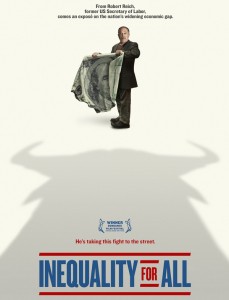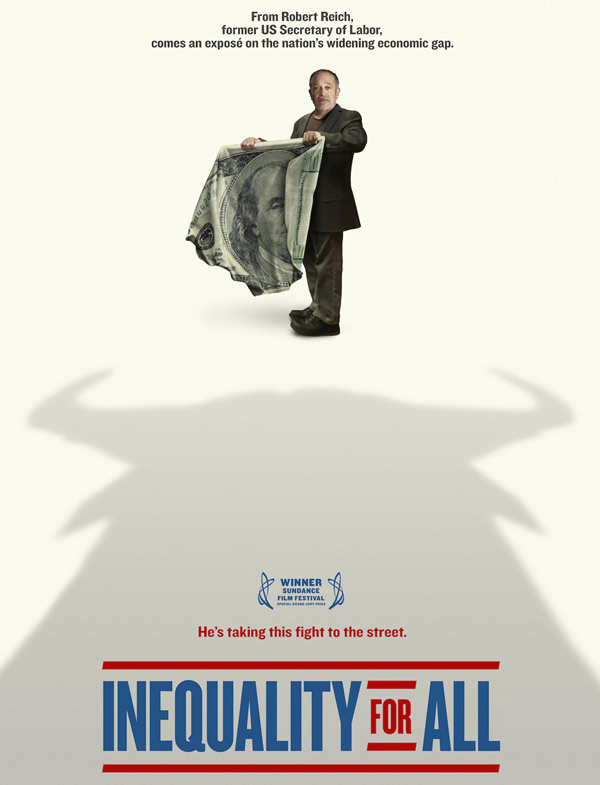By Jacob Kornbluth (See Part One HERE).
 So there I was. I had totally given up on my film career in LA, and gone to live in Berkeley, CA. In trying to put together a fiction film, I had met Robert Reich and become friends with him. Reich and I had started making short videos together, they were successful, and I had begun thinking about how to make a film about what had happened to the American economy and the Middle class. But I had no idea where to start.
So there I was. I had totally given up on my film career in LA, and gone to live in Berkeley, CA. In trying to put together a fiction film, I had met Robert Reich and become friends with him. Reich and I had started making short videos together, they were successful, and I had begun thinking about how to make a film about what had happened to the American economy and the Middle class. But I had no idea where to start.
The first thing I did was try to get some sense of who was making films in the Bay Area.
I reached out to the San Francisco Film Society, and met with an amazing woman named Michele Turnure-Salleo. We had lunch, talked about mutual friends. I made it out to a few events, said hi to some people. Michelle invited me to be on a panel – about pitching projects – of all things for a guy who had been so horrible at pitching to talk about! On that panel I met a producer named Jen Chaiken. When Jen was getting introduced, I was particularly interested in the fact that she had produced some documentaries and some fiction films.
I reached out to Jen – might she meet for a coffee? She said yes. Just like a real person. No film industry bullshit.
The first thing Jen told me was that she didn’t want to do docs anymore. There just wasn’t a long-term plan for a producer in docs. They took forever and made no money. I told her I understood, but then just started talking about the film and why I wanted to do it. I told her I thought it could be something big. I thought the biggest story of our time is the struggles of the economy, the hallowing out of the middle class, and the widening income inequality that underlies it all. It’s tough to have perspective on history when you are in the middle of it. No one had told that story, and it was crucial that Americans – all Americans, with any luck – heard it. We had to change the debate in America. For the good our children, and our children’s children.
In other words, the guy who couldn’t pitch in Hollywood (not even to save my life!) had just given the pitch of my life by speaking my heart and not pitching at all.
Of course, that didn’t stop Jen from saying “no” and sending me on my way.
But then Jen went to Sundance. Despite herself, she found herself reconnecting with some of her old documentary colleagues. She realized she had a real connection to them, and missed doing something she believed in, marketplace-be-damned. She and her producing partner, Sebastian Dungan, started having talks about how maybe – just maybe – they could do a doc if they were passionate about the topic and it felt ambitious enough. It probably wouldn’t turn in to anything, of course, but maybe they should just take one meeting together with this Jake Kornbluth guy and see what he had to say.
It’s tough to say when these things really start to feel solid. The three of us agreed to work together, then spent a year flailing to figure out how to make a movie about “the economy”. I wrote failed treatment after failed treatment, the Occupy Movement came out of nowhere, and we still hadn’t started. We discussed tanking the project almost every conversation.
Then, as a last ditch effort and almost despite ourselves, we just started shooting. Robert Reich was going to be the center of the movie, so we shot him when he was speaking. He teaches a class, so we shot him teaching. He knew we were shooting, but really didn’t have any chance that he was at the center of a real “movie”. For an issue-oriented film, I would have thought that as the filmmakers we would know what we were doing going in, but our process was painfully organic.
I absolutely loved the material and process of making the doc, though. This was storytelling at the intersection of character and idea. It was perfectly suited to who I am and how I think. I went to sleep every night practically giddy with excitement. Jen, Sebastian, and I poured ourselves into the work of making it. My fear in Hollywood was that I wasn’t ever going to get a shot to do something I believed in. The best I could hope for was to make a living and have a job in film – an accomplishment, no doubt – but if I failed at it, I knew that I would have regret that I didn’t ever get to fail at doing something I felt was really ME. I could now rest easy. If this failed, well, this was failure I could live with.
We premiered at Sundance this past January, and won a Special Jury Prize for Achievement in Filmmaking. The Weinstein Company/Radius picked it up for distribution in a competitive all night bidding war. We’ve played at festivals all over the country, and just won the Audience Award at Michael Moore’s film fest in Traverse City. Now we’re releasing the film theatrically in the top 25 markets. The whole thing is a fantastic, inspiring blur.
In retrospect, everything makes more sense. The team that made this film – from Jen and Sebastian, to our brilliant editor Kim Roberts, to Dan Krauss and Svetlana Cvetko and the whole camera team, the composer Marco d’Ambrosio and everyone in the production and post-production process – I really felt that the whole team was full of brilliant artists in their own right and as collaborative of a group as you could ever hope for. Of course it worked, you might say.
But imagine if you were me. Broke, career going nowhere, and desperate to figure out how to make a living, bailed out and moved into a Craig’s List shared rental in Northern California. Maybe because I had no choice, I followed my heart. Oh yeah, one more thing – that schoolteacher roommate who I fell for? We’re married now, and have a beautiful 4-month old baby.
I know it is a cliché. I know you hear it over and over. But I’m living proof: sometimes it helps to do what you love.
Jacob Kornbluth is an award winning writer and director of feature films, television, and theater. His latest film, INEQUALITY FOR ALL, won the Special Jury Award for Achievement in Filmmaking at this year’s Sundance Film Festival and will be released by The Weinstein Company / Radius-TWC on September 27th in theaters nationwide.






